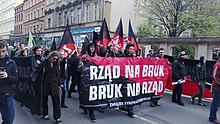Anarchism in Poland
You can help expand this article with text translated from the corresponding article in Polish. (April 2013) Click [show] for important translation instructions.
|
| Part of a series on |
| Anarchism |
|---|
 |
Anarchism in Poland first developed at the turn of the 20th century under the influence of anarchist ideas from Western Europe and from Russia.[1]
Prior to Polish independence from the Russian Empire, several anarchist organizations emerged within the area that would become the Second Polish Republic. The first of these, known as "The Struggle", formed in Białystok in 1903. In the following years similar organizations established themselves in Gniezno, Warsaw, Łódź, Siedlce, Częstochowa, Kielce, and other towns. One of the most active, a group known as "International", had its base in Warsaw. This group, composed of Jewish workers, organized strikes throughout the city during the Polish insurrection of 1905.[2]
The tsarist régime (which controlled much of Poland before 1914) acted with a high level of despotism. The authorities commonly fired on demonstrating workers. In January 1906 the authorities arrested sixteen members of the International group and shot them without trial.[3]

Significant Polish theorists of anarchism and anarcho-syndicalism included Edward Abramowski (1868-1918), Jan Wacław Machajski (1866-1926), Augustyn Wróblewski (1866-1923) and Rafał Górski (1973-2010).
See also
Notes
- ^ "1903-1981: Anarchism in Poland".
- ^ Nagorski, R. (1977). "History of the Anarchist Movement in Poland". Cienfuegos Press Anarchist Review (2): 20–22.
- ^ Rocker, Rudolf (2005). The London Years. Nottingham: Five Leaves Publications. p. 110. ISBN 1-904859-22-4.
